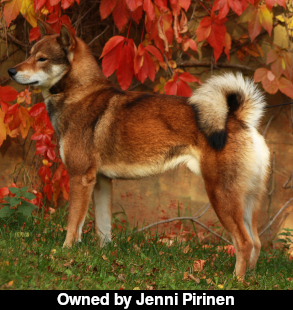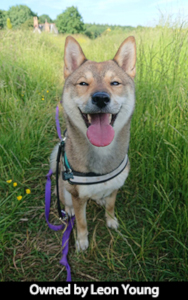


The Japanese Shikoku Ken is a medium sized member of the Nihon Ken family. The Shikoku originates from the Kochi prefecture of Shikoku, and was used to hunt boar and wild game. The Shikoku is the of the rarest Nihon Ken breeds. Originally an ancestor of the Tosa Inu (Tosa Fighting Dog), the Shikoku Ken was previously called Tosa Ken, however its name was changed to prevent confusion between the two breeds. The Japanese Government recognized this breed as a National Treasure in 1937.
The Shikoku Ken is not currently recognized by the UK Kennel Club, but is recognized by the FCI (Fédération Cynologique International).
The Shikoku has a thick double coat, which comes in red, black and tan, and a variety of sesame colours. They have erect ears and a slightly longer muzzle compared to the other Nihon Ken Breeds. Their tails are either sickle or curved. They are agile and lean, whilst being very sturdy and have great endurance. They enjoy hikes and are able to run through mountainous regions. They stand between 49cm-53cm at the withers, can weigh between 16kg-26kg and live up to 14 years old.

The Shikoku is energetic and alert, and will have a very strong bond with their owner and family. They are incredibly loyal, have a lot of confidence, and are great with children if introduced early enough. They can be standoffish towards strangers, and are known to be unwilling to initiate stranger contact. Training throughout their lives is required to overcome their wariness of strangers, and because of this, they are not usually recommended for first time dog owners. They retain a very high prey drive, and are very good at scent tracking and agility, even today. It is recommended that they are not housed with small animals due to their high prey drive.
The Shikoku have a high rate of cryptorchidism (retained testicle) and skin allergies. They can also suffer from entropion, panosteitis, and seizures. They are known to suffer from a fatal enzyme storage disease called Lysosomol Storage Disease. It is unknown what causes it and there is currently no cure for this disease, however, there have been few confirmed incidences of it within the breed.
For more information on the Shikoku Ken, and in-depth information regarding health issues within the breed, please visit our sister site, the Nihon Ken Network.
If you have photos of your Shikoku Ken that you would be happy for us to feature here, please send us an email with your photos: info@nihonken.co.uk! Photos need to be of good quality, taken outdoors, preferably without people in them. We would love to feature your dogs!
